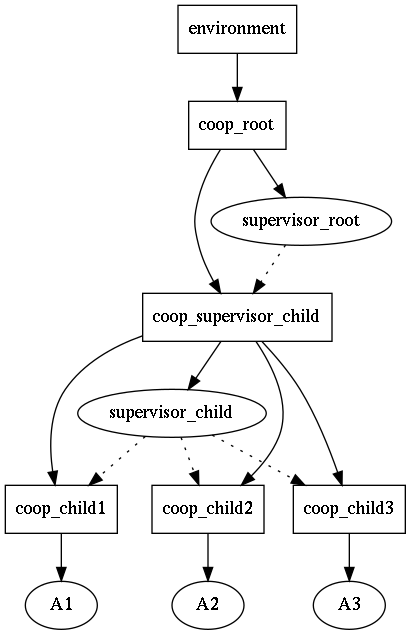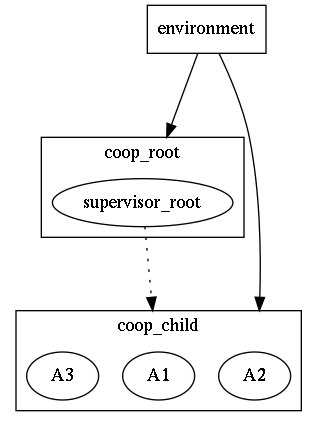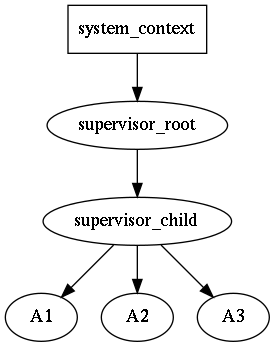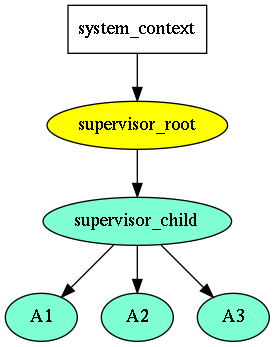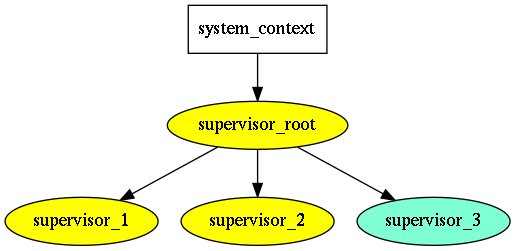Request Response Message Exchange Pattern
Introduction
The plan is to examine request/response pattern in "abstract" actor framework, and find why it is not so trivial to implement as it might appear at the first. Later, we'll see how various C++ actor frameworks (CAF, sobjectizer, rotor) support the pattern.
The Request Response Message Exchange Pattern sounds quite simple: a client
asks a server to proccess a request and return response to the client
once it is done.
Synchronous analogy
This is completely artificial analogy, however it seem useful for further explanations.
It can be said, that in synchronous request-response can be simply presented as just a regular function call, where request is input parameter to a function, and the response is the return type, i.e.
struct request_t { ... };
struct response_t { ... };
response_t function(const request_t&) { ... }
The "server" here is the function inself, and the "client" is the call-side side.
The semantic of this function says that the function always successfully processes a request and return a result.
Probably, the most modern way to express that a function might fail is to wrap the response into monad-like wrapper, like std::optional, std::expected, boost::outcome etc.
Probably, the mostly used way to let the caller know that request processing
failed is to throw an exception. However, it is not expressible in the modern C++,
so it should be mentioned somewhere in documentation or just assumed; in other
words, from the function signature response_t function(const request_t&) never
knows whether it always successfully processes request or sometimes it might
fail and thrown an exception.
Problems of naive approach in actor framework
Let's realize the simple request-response approach within the imaginary actor
framework: the on_request method of server-actor is called with the request
payload, and it returns the response_t
response_t server_t::on_request(request_t &)
The naive implementation of request-response approach follows the
same pattern as in synchronous analogy, when it "forgets" to express that
the request processing might fail. The actor framework responsibility is
to wrap payload (response_t, request_t) into messages (message<request_t>)
and deliver them as messages to related actors (client-actor, server-actor).
Later the payload will be unpacked.
The corresponding receiver interface of the client-actor will be like:
void client_t::on_response(response_t&)
While it looks OK, how will the client-actor be able to distinguish responses from different requests?
The first solution would be to use some conventions on the request/response
protocol, i.e. inject some synthetic request_id into request_t and
somewhere into response_t, generate and set it on request-side (client-actor)
and presume that the server-actor will set it back together with the response.
There is a variation of the solution, when the request_t is completely
embedded into response_t.
While this will definitely work as it will be shown below with sobjectizer
framework, this also means that there is no help from a actor framework
and the burden of the implementation lies completely on a developer.
The second solution is to let it be managed somehow by an actor framework: let is suspend client-actor execution until the response will be received. The "suspending" in the context means that all messages for the client-actor will be queued until the response will be received.
This will work as soon as everything goes fine. However, as soon as something goes wrong (i.e. server-actor cannot process the request), the whole client-actor will stuck: It will not able to process any message, because it infinitely waits the particular one (the response).
In terms of actor-design the client-actor becomes non-reactive at the moment
when it stops processing messages, which was a "feature" of the imaginary
naive actor framework to "wait" the response.
You might guess, the per-request timeout timer, can resolve the problem. Yes, indeed, however how in the interface
void client_t::on_response(response_t&)
it is possible to tell client-actor about timeout trigger? I don't see an acceptable way to do that. It is paradoxical situation, that a failure can be detected, but there is no way to react on it.
Anyway, even if there would be a way to notify client-actor about failure,
it still does not completely solves the non-reactivity problem: an actor
becomes reactive only after timeout trigger, and until that it is still
"suspended" waiting response_t or timeout trigger.
The root of the problem caused by "forgetfulness" of the server-actor interface to specify, that it might fail. It's time to review our interfaces, then.
No framework support for req/res pattern
Let's summarize the necessary pieces, which are required to implement request/response pattern in actor-like manner.
First, the server-actor might fail in processing the request, and it need to tell the framework and client-actor about the failure.
Second, the response should enriched to contain the original request_id
to make it possible for client-actor to map the response to the request.
(In other sources it might be named correlation_id, which serves the
same purpose).
Third, the original request from the client-actor should also contain
the request_id.
Forth, as the original response payload might be missing at all, it
should be wrapped monad-like container (std::optional, std::unique_ptr
etc.)
So, our basic structures should look like:
struct request_t { ... };
struct response_t { ... };
using request_id_t = std::uint32; /* as as example */
struct wrapped_request_t {
request_id_t request_id;
request_t req;
};
enum class request_error_t { SUCCESS, TIMEOUT, FAIL_REASON_1_1, ... };
struct wrapped_response_t {
request_error_t request_error;
request_id_t request_id;
std::optional<response_t> res; /* may be it'll contain the payload */
};
And the corresponding actor interfaces will be:
wrapped_response_t server_t::on_request(wrapped_request_t& ) { ... }
void client_t::on_response(wrapped_response_t& ) { ... }
The FAIL_REASON_1_1 and other error codes are desirable, if the server
wants fail early and notify client about that. Otherwise, if server cannot
process request, it silently ignores the request; however client will be notified
only via timeout and it can only guess, what exactly was wrong. In other words,
it is not good practice in general ignore wrong requests; react on them is
much better.
So, sending an request from client to server should be like:
struct client_t {
...
request_id_t last_request_id = 1;
};
void client_t::some_method() {
auto req_id = ++last_request_id;
auto request = request_t{ ... };
framework.send(server_address, wrapped_request_t{ req_id, std::move(request) } );
}
However, the story does not end here, as the timeout-timer part is missing (i.e. for the case, when server-actor does not answer at all). The needed pieces are: 1) per request timeout timer; 2) when the response arrives in time, the timer should be cancelled; 3) otherwise, the message with empty payload and timeout-fail reason should be delivered; 4) if the response still arrives after timeout trigger, it should be silently discarded. There is a sense to have this things in dedicated methods.
/* whatever that is able to identify particular timer instance */
using timer_id_t = ...;
struct client_t {
using timer_map_t = std::unordered_map<timer_id_t, request_id_t>;
/* reverse mapping */
using request_map_t = std::unordered_map<request_id_t, timer_id_t>;
...
request_id_t last_request_id = 1;
timer_map_t timer_map;
request_map_t request_map;
};
void client_t::some_method() {
auto req_id = ++last_request_id;
auto request = request_t{ ... };
framework.send(server_address, wrapped_request_t{ req_id, std::move(request) } );
/* start timer */
auto timer_id = timers_framework.start_time(timeout);
timer_map.emplace(timer_id, req_id);
request_map.emplace(req_id, timer_id);
}
void client_t::on_timer_trigger(timer_id_t timer_id) {
auto request_id = timer_map[timer_id];
this->on_response(wrapped_response_t{ request_error_t::TIMEOUT, request_id });
timer_map.erase(timer_id);
request_map.erase(request_id);
}
void client_t::on_response_guard(wrapped_response_t& r) {
if (request_map.count(r.request_id) == 0) {
/* no timer, means timer already triggered and timeout-response was
delivered, just discard the response */
return;
}
auto timer_id = request_map[r.request_id];
timers_framework.cancel(timer_id);
this->on_response(r); /* actually deliver the response */
timer_map.erase(timer_id);
request_map.erase(request_id);
}
Now, the example is complete. It should be able to handle request-responses in a robust way. However, there is no actual request processing code, and a lot of auxiliary code to make it responsible and robust.
The worse thing, if that the boilerplate code have to be repeated for every request-response pair type. It is discouraging and error-prone way of development; an developer might end up frustrated with actor-design at all.
req/res approach with sobjectizer
The sobjectizer actor framework
at the moment has version 5.6 and does not help in request-response pattern
usage. So, basically, it is like the request-response sample above without
framework support, with sobjectizer's specifics, of course.
In the example below the "probabilistic pong" (server role) is used: i.e. randomly
it successfully answers to ping-requests, and sometimes it just ignores the
requests. The pinger (client role) should be able to detect the both cases.
#include <so_5/all.hpp>
#include <optional>
#include <random>
#include <unordered_map>
using request_id_t = std::uint32_t;
using namespace std::literals;
struct ping {};
struct pong {};
struct timeout_signal {
request_id_t request_id;
};
enum class request_error_t { SUCCESS, TIMEOUT };
struct wrapped_ping {
request_id_t request_id;
ping payload;
};
struct wrapped_pong {
request_id_t request_id;
request_error_t error_code;
std::optional<pong> payload;
};
class pinger final : public so_5::agent_t {
using timer_t = std::unique_ptr<so_5::timer_id_t>;
using request_map_t = std::unordered_map<request_id_t, timer_t>;
so_5::mbox_t ponger_;
request_map_t request_map;
request_id_t last_request = 0;
void on_pong(mhood_t<wrapped_pong> cmd) {
auto &timer = request_map.at(cmd->request_id);
timer->release();
request_map.erase(cmd->request_id);
on_pong_delivery(*cmd);
}
void on_pong_delivery(const wrapped_pong &cmd) {
bool success = cmd.error_code == request_error_t::SUCCESS;
auto request_id = cmd.request_id;
std::cout << "pinger::on_pong " << request_id << ", success: " << success << "\n";
so_deregister_agent_coop_normally();
}
void on_timeout(mhood_t<timeout_signal> msg) {
std::cout << "pinger::on_timeout\n";
auto request_id = msg->request_id;
request_map.erase(request_id);
wrapped_pong cmd{request_id, request_error_t::TIMEOUT};
on_pong_delivery(cmd);
}
public:
pinger(context_t ctx) : so_5::agent_t{std::move(ctx)} {}
void set_ponger(const so_5::mbox_t mbox) { ponger_ = mbox; }
void so_define_agent() override { so_subscribe_self().event(&pinger::on_pong).event(&pinger::on_timeout); }
void so_evt_start() override {
auto request_id = ++last_request;
so_5::send<wrapped_ping>(ponger_, request_id);
auto timer = so_5::send_periodic<timeout_signal>(*this, so_direct_mbox(), 200ms,
std::chrono::milliseconds::zero(), request_id);
auto timer_ptr = std::make_unique<so_5::timer_id_t>(std::move(timer));
request_map.emplace(request_id, std::move(timer_ptr));
}
};
class ponger final : public so_5::agent_t {
const so_5::mbox_t pinger_;
std::random_device rd;
std::mt19937 gen;
std::uniform_real_distribution<> distr;
public:
ponger(context_t ctx, so_5::mbox_t pinger) : so_5::agent_t{std::move(ctx)}, pinger_{std::move(pinger)}, gen(rd()) {}
void so_define_agent() override {
so_subscribe_self().event([this](mhood_t<wrapped_ping> msg) {
auto dice_roll = distr(gen);
std::cout << "ponger::on_ping " << msg->request_id << ", " << dice_roll << "\n";
if (dice_roll > 0.5) {
std::cout << "ponger::on_ping (sending pong back)" << std::endl;
so_5::send<wrapped_pong>(pinger_, msg->request_id, request_error_t::SUCCESS, pong{});
}
});
}
};
int main() {
so_5::launch([](so_5::environment_t &env) {
env.introduce_coop([](so_5::coop_t &coop) {
auto pinger_actor = coop.make_agent<pinger>();
auto ponger_actor = coop.make_agent<ponger>(pinger_actor->so_direct_mbox());
pinger_actor->set_ponger(ponger_actor->so_direct_mbox());
});
});
return 0;
}
Output sample:
ponger::on_ping 1, 0.475312
pinger::on_timeout
pinger::on_pong 1, success: 0
Other output sample:
ponger::on_ping 1, 0.815891
ponger::on_ping (sending pong back)
pinger::on_pong 1, success: 1
It should be noted, that request/response pattern was supported in sobjectizer
before
version 5.6, however it was dropped (well, moved to
sobjectizer-extra, which has
different licensing terms). The request/response was easy as the following like:
auto r = so_5::request_value<Result,Request>(mbox, timeout, params);
It is convenient; nevertheless, from the explanation sample "How does it work?", the following sample is available:
// Waiting and handling the result.
auto wait_result__ = f__.wait_for(timeout);
if(std::future_status::ready != wait_result__)
throw exception_t(...);
auto r = f__.get();
it suffers the same non-reactivity taint as described above, i.e. lack of possibility to answer other messages, while waiting a response. Hence, you can see "Deadlocks" section in the documentation, and the developers responsibility to handle the situation.
req/res approach with CAF
The C++ actor framework (aka CAF), does support request/response approach.
#include <chrono>
#include <iostream>
#include <random>
#include <string>
#include "caf/all.hpp"
#include "caf/optional.hpp"
#include "caf/sec.hpp"
using std::endl;
using std::string;
using namespace std::literals;
using namespace caf;
using ping_atom = atom_constant<atom("ping")>;
using pong_atom = atom_constant<atom("pong")>;
void ping(event_based_actor *self, actor pong_actor) {
aout(self) << "ping" << endl;
self->request(pong_actor, 1s, ping_atom::value)
.then([=](pong_atom ok) { aout(self) << "pong received" << endl; },
[=](error err) {
aout(self) << "pong was NOT received (timed out?), error code = "
<< err.code() << endl;
});
}
behavior pong(event_based_actor *self) {
using generator_t = std::shared_ptr<std::mt19937>;
using distrbution_t = std::shared_ptr<std::uniform_real_distribution<double>>;
std::random_device rd;
auto gen = std::make_shared<typename generator_t::element_type>(rd());
auto distr = std::make_shared<typename distrbution_t::element_type>();
return {[=](ping_atom) {
auto dice = (*distr)(*gen);
aout(self) << "pong, dice = " << dice << endl;
if (dice > 0.5) {
return optional<pong_atom>(pong_atom::value);
}
return optional<pong_atom>();
}};
}
void caf_main(actor_system &system) {
auto pong_actor = system.spawn(pong);
auto ping_actor = system.spawn(ping, pong_actor);
}
CAF_MAIN()
Output sample:
ping
pong, dice = 0.571207
pong received
Another output sample:
ping
pong, dice = 0.270214
pong was NOT received (timed out?), error code = 2
The call client_actor->request(server_actor, timeout, args..) returns an intermediate
future-like object, where then method can be invoked with forwarded one-shot
actor behaviour. And, yes, there is await method too with non-reactive behaviour,
where you can shoot easily yourself with deadlock. So, according to the
documentation
then method is what we need, as it "multiplexes the one-shot handler with the
regular actor behaviour and handles requests as they arrive".
req/res approach with rotor
The rotor does support request/response
approach since v0.04
#include <rotor/ev.hpp>
#include <iostream>
#include <random>
namespace payload {
struct pong_t {};
struct ping_t {
using response_t = pong_t;
};
} // namespace payload
namespace message {
using ping_t = rotor::request_traits_t<payload::ping_t>::request::message_t;
using pong_t = rotor::request_traits_t<payload::ping_t>::response::message_t;
} // namespace message
struct pinger_t : public rotor::actor_base_t {
using rotor::actor_base_t::actor_base_t;
void set_ponger_addr(const rotor::address_ptr_t &addr) { ponger_addr = addr; }
void on_initialize(rotor::message::init_request_t &msg) noexcept override {
rotor::actor_base_t::on_initialize(msg);
subscribe(&pinger_t::on_pong);
}
void on_start(rotor::message_t<rotor::payload::start_actor_t> &) noexcept override {
request<payload::ping_t>(ponger_addr).send(rotor::pt::seconds(1));
}
void on_pong(message::pong_t &msg) noexcept {
auto &ec = msg.payload.ec;
if (!msg.payload.ec) {
std::cout << "pong received\n";
} else {
std::cout << "pong was NOT received: " << ec.message() << "\n";
}
supervisor.do_shutdown();
}
rotor::address_ptr_t ponger_addr;
};
struct ponger_t : public rotor::actor_base_t {
using generator_t = std::mt19937;
using distrbution_t = std::uniform_real_distribution<double>;
std::random_device rd;
generator_t gen;
distrbution_t dist;
ponger_t(rotor::supervisor_t &sup) : rotor::actor_base_t{sup}, gen(rd()) {}
void on_initialize(rotor::message::init_request_t &msg) noexcept override {
rotor::actor_base_t::on_initialize(msg);
subscribe(&ponger_t::on_ping);
}
void on_ping(message::ping_t &req) noexcept {
auto dice = dist(gen);
std::cout << "pong, dice = " << dice << std::endl;
if (dice > 0.5) {
reply_to(req);
}
}
};
int main() {
try {
auto *loop = ev_loop_new(0);
auto system_context = rotor::ev::system_context_ev_t::ptr_t{new rotor::ev::system_context_ev_t()};
auto timeout = boost::posix_time::milliseconds{10};
auto conf = rotor::ev::supervisor_config_ev_t{
timeout, loop, true, /* let supervisor takes ownership on the loop */
};
auto sup = system_context->create_supervisor<rotor::ev::supervisor_ev_t>(conf);
auto pinger = sup->create_actor<pinger_t>(timeout);
auto ponger = sup->create_actor<ponger_t>(timeout);
pinger->set_ponger_addr(ponger->get_address());
sup->start();
ev_run(loop);
} catch (const std::exception &ex) {
std::cout << "exception : " << ex.what();
}
std::cout << "exiting...\n";
return 0;
}
Output sample:
pong, dice = 0.90477
pong received
Another output sample:
pong, dice = 0.24427
pong was NOT received: request timeout
Comparing to CAF, rotor's version is more
verbose in the terms of LOC (lines of code). Partly this is caused by omitted
main in CAF, while in rotor the main cannot be shortened because
it is assumed to work with different loop backends as well as in cooperation
with them and other non-actor loop components; partly because of in CAF
the message is hidden from user, while in rotor is is exposed outside
due to performance reasons (i.e. allow the payload to be smart-pointer
to have zero-copy); and finally because of CAFs intensive usage of
lambdas, which leads to more compact code.
However, it is still what it needed: reactive reactive request-response.
Request/Response composability
On the top of request-response pattern, the ask pattern can be developed.
In short, an client-actor makes several of requests, and then, depending on the
results it makes an appropriate action. See
akka
docs as an example,
However, the ask pattern it is a little bit more general: it should be possible to access to the initial context (message) as well as to all responses (some of which might fail).
The sobjectizer does not offer support request-response patters, so it is out of
comparison. The sobjectizer-extra offers std::future based solution,
however, as we seen, it not reactive (while(!fututure.is_ready()){ ... })
and as the std::futures are not compose-able, the ask pattern cannot
be implemented.
As we've seen with CAF lambda approach, there are 2 lambdas per request
(one is for fail response and another is for success response); each one
captures outer request context and has access to its own response. Nonetheless,
none of the lambdas has access to the contexts of the other requests; in
other words the common context (which can include the original message)
should be shared between them, and the code compactness seems to lost.
Here is an example how to compose two ping-pong requests, where any of them might fail.
#include <chrono>
#include <iostream>
#include <random>
#include <string>
#include "caf/all.hpp"
#include "caf/optional.hpp"
#include "caf/sec.hpp"
using std::endl;
using std::string;
using namespace std::literals;
using namespace caf;
using ping_atom = atom_constant<atom("ping")>;
using pong_atom = atom_constant<atom("pong")>;
struct shared_context_t {
std::size_t pings_left;
std::size_t pings_success = 0;
std::size_t pings_error = 0;
shared_context_t(std::size_t pings_left_) : pings_left{pings_left_} {}
void output_results() {
if (pings_left == 0) {
// unsafe, aout should be used, but how to capture it?
std::cout << "success: " << pings_success << ", errors: " << pings_error
<< "\n";
}
}
void record_success() {
++pings_success;
--pings_left;
output_results();
}
void record_fail() {
++pings_error;
--pings_left;
output_results();
}
};
void ping(event_based_actor *self, actor pong_actor1, actor pong_actor2) {
aout(self) << "ping" << endl;
auto context = std::make_shared<shared_context_t>(2);
self->request(pong_actor1, 1s, ping_atom::value)
.then([=](pong_atom ok) { context->record_success(); },
[=](error err) { context->record_fail(); });
self->request(pong_actor2, 1s, ping_atom::value)
.then([=](pong_atom ok) { context->record_success(); },
[=](error err) { context->record_fail(); });
}
behavior pong(event_based_actor *self) {
using generator_t = std::shared_ptr<std::mt19937>;
using distrbution_t = std::shared_ptr<std::uniform_real_distribution<double>>;
std::random_device rd;
auto gen = std::make_shared<typename generator_t::element_type>(rd());
auto distr = std::make_shared<typename distrbution_t::element_type>();
return {[=](ping_atom) {
auto dice = (*distr)(*gen);
aout(self) << "pong, dice = " << dice << endl;
if (dice > 0.5) {
return optional<pong_atom>(pong_atom::value);
}
return optional<pong_atom>();
}};
}
void caf_main(actor_system &system) {
auto pong_actor1 = system.spawn(pong);
auto pong_actor2 = system.spawn(pong);
auto ping_actor = system.spawn(ping, pong_actor1, pong_actor2);
}
CAF_MAIN()
Output sample:
ping
pong, dice = 0.818207
pong, dice = 0.140753
success: 1, errors: 1
Another output sample:
ping
pong, dice = 0.832334
pong, dice = 0.744168
success: 2, errors: 0
I'm not CAFs expert, but it seems that in shared context it needs to
be captured the original behaviour to access aout, and there is need
to have two methods per each request type (or single composed one
with takes composite monad-like result).
Let's see how it works with rotor, however actors' addressing should be
explained first. Akka and CAF actor frameworks use the ActorRef
notion to (globally) identify an actor. It seems that there is one-to-one
matching between ActorRef and the actor. In rotor address is completely
decoupled from actor, and it can process messages on any address it is
subscribed to. There is "main" (or default) actors address which is used
for main rotor mechanics, still it can be subscribed to any address
and process messages on it.
That technique is shown below, when an ephemeral address is created and an unique association between that address and context is created. Here is a full code:
#include <rotor/ev.hpp>
#include <iostream>
#include <random>
#include <unordered_map>
namespace payload {
struct pong_t {};
struct ping_t {
using response_t = pong_t;
};
} // namespace payload
namespace message {
using ping_t = rotor::request_traits_t<payload::ping_t>::request::message_t;
using pong_t = rotor::request_traits_t<payload::ping_t>::response::message_t;
} // namespace message
struct shared_context_t {
std::size_t pings_left;
std::size_t pings_success = 0;
std::size_t pings_error = 0;
};
struct pinger_t : public rotor::actor_base_t {
using map_t = std::unordered_map<rotor::address_ptr_t, shared_context_t>;
using rotor::actor_base_t::actor_base_t;
void set_ponger_addr1(const rotor::address_ptr_t &addr) { ponger_addr1 = addr; }
void set_ponger_addr2(const rotor::address_ptr_t &addr) { ponger_addr2 = addr; }
void on_start(rotor::message_t<rotor::payload::start_actor_t> &) noexcept override {
reply_addr = create_address();
subscribe(&pinger_t::on_pong, reply_addr);
request_via<payload::ping_t>(ponger_addr1, reply_addr).send(rotor::pt::seconds(1));
request_via<payload::ping_t>(ponger_addr2, reply_addr).send(rotor::pt::seconds(1));
request_map.emplace(reply_addr, shared_context_t{2});
}
void on_pong(message::pong_t &msg) noexcept {
auto &ctx = request_map[msg.address];
--ctx.pings_left;
auto &ec = msg.payload.ec;
if (ec) {
++ctx.pings_error;
} else {
++ctx.pings_success;
}
if (!ctx.pings_left) {
std::cout << "success: " << ctx.pings_success << ", errors: " << ctx.pings_error << "\n";
// optional cleanup
unsubscribe(&pinger_t::on_pong, reply_addr);
request_map.erase(msg.address);
supervisor.do_shutdown();
}
}
map_t request_map;
rotor::address_ptr_t ponger_addr1;
rotor::address_ptr_t ponger_addr2;
rotor::address_ptr_t reply_addr;
};
struct ponger_t : public rotor::actor_base_t {
using generator_t = std::mt19937;
using distrbution_t = std::uniform_real_distribution<double>;
std::random_device rd;
generator_t gen;
distrbution_t dist;
ponger_t(rotor::supervisor_t &sup) : rotor::actor_base_t{sup}, gen(rd()) {}
void on_initialize(rotor::message::init_request_t &msg) noexcept override {
rotor::actor_base_t::on_initialize(msg);
subscribe(&ponger_t::on_ping);
}
void on_ping(message::ping_t &req) noexcept {
auto dice = dist(gen);
std::cout << "pong, dice = " << dice << std::endl;
if (dice > 0.5) {
reply_to(req);
}
}
};
int main() {
try {
auto *loop = ev_loop_new(0);
auto system_context = rotor::ev::system_context_ev_t::ptr_t{new rotor::ev::system_context_ev_t()};
auto timeout = boost::posix_time::milliseconds{10};
auto conf = rotor::ev::supervisor_config_ev_t{
timeout, loop, true, /* let supervisor takes ownership on the loop */
};
auto sup = system_context->create_supervisor<rotor::ev::supervisor_ev_t>(conf);
auto pinger = sup->create_actor<pinger_t>(timeout);
auto ponger1 = sup->create_actor<ponger_t>(timeout);
auto ponger2 = sup->create_actor<ponger_t>(timeout);
pinger->set_ponger_addr1(ponger1->get_address());
pinger->set_ponger_addr2(ponger2->get_address());
sup->start();
ev_run(loop);
} catch (const std::exception &ex) {
std::cout << "exception : " << ex.what();
}
std::cout << "exiting...\n";
return 0;
}
Output sample:
pong, dice = 0.472509
pong, dice = 0.305997
success: 0, errors: 2
Another output sample:
pong, dice = 0.103796
pong, dice = 0.8862
success: 1, errors: 1
Rotor has special support of requests to be replied to custom addresses
(i.e. request_via method). The main difference with the CAF that instead
of multiple lambdas with additional methods (record_success and record_fail)
and "gather-them-all" method (output_results), with rotor there is
just single gather-them-all method (on_pong), which actually has exactly
the same signature when as the previous example with rotor.
Conclusion
When you start thinking about possible failures the initially request response schema abruptly becomes non-trivial. Timeout and other errors should be handled and without framework support the code quite quickly becomes cumbersome.
There is still additional requirements, that the provided by a framework support of request/response pattern did not come of cost of loosing actor's reactivity; for simplicity, you may treat it as dead-lock avoidance. Another nice-to-have feature would be composability of the requests.
At the moment sobjectizer does not provides request/response pattern,
however in the past it did, however it was non-reactive.
Both CAF and rotor do provide request/response pattern keeping
still actors reactive. CAF has more compact code; the rotor's
code is more verbose. It seems that in CAF you should roll
you own composability of requests, i.e. develop context class
and make it shared between different requests handlers. In rotor
the composability of requests seems more natural via creating
ephemeral reply addresses, which can associate the linked group
of requests in single place.
Update
The sobjectizer author replied with separate
article.
, which I recommend to read.
So, it should be updated, that sobjetizer-extra
provides support for request-response pattern, but only via a bit
different name (async_op, in the case). It is completely
asynchronous and free of dead-locks, i.e. reactive.
It is also
composable,
with the approximately same lines of code as rotor example.
The composability is done via lambdas (as in CAF), but
the responses are redirected to different mboxes (as the
ephemeral addresses in rotor).
So, it is possible to get the same result with all considered frameworks.

